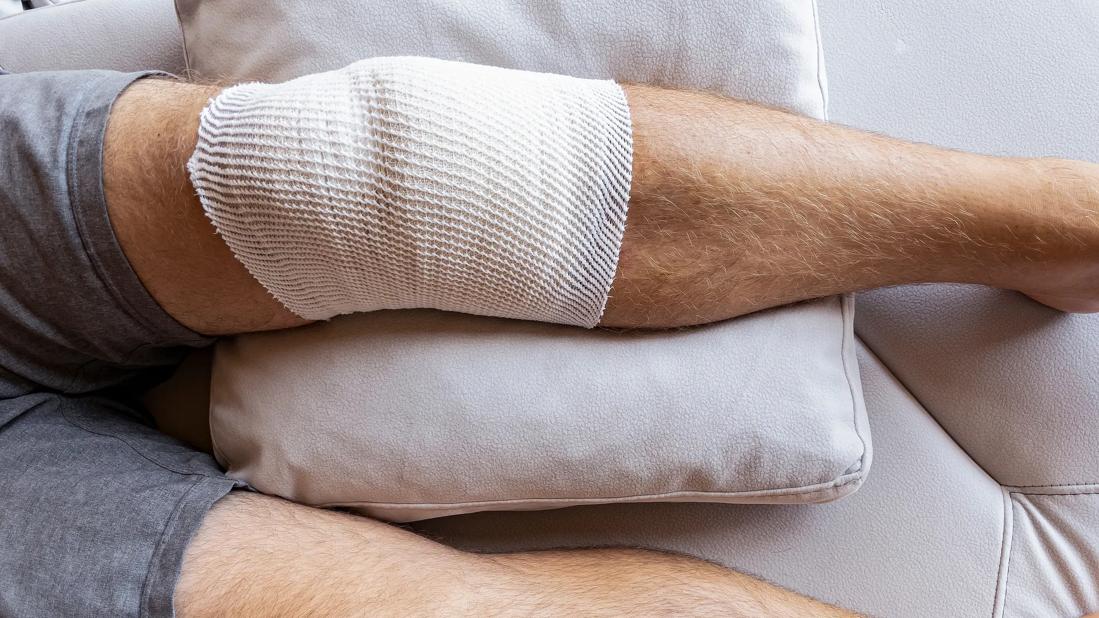You may have to keep your leg straight, but you can sleep in any position

Image content: This image is available to view online.
View image online (https://assets.clevelandclinic.org/transform/020d85f6-d6ef-415e-b059-ebf04246eef7/knee-wrap-post-surgery-1403472946)
Person resting on couch with bandaged knee elevated on couch pillow
It’s a catch-22. Sleep is essential for healing after meniscus (knee) surgery. But the pain and discomfort from surgery can make for long, sleepless nights.
Advertisement
Cleveland Clinic is a non-profit academic medical center. Advertising on our site helps support our mission. We do not endorse non-Cleveland Clinic products or services. Policy
You may wonder if it’s OK to try different positions. “In general, getting enough sleep is more important than your sleep position,” explains orthopaedic surgeon Joseph Tramer, MD. “Back, side and even stomach sleeping are OK if they help you get the rest you need.”
When nonsurgical treatments for a meniscus tear don’t help, knee surgery may be your best option. Your surgeon typically performs meniscus surgery as an arthroscopic (minimally invasive) procedure. It involves two small incisions on either side of your knee, just below your kneecap.
Meniscus surgery is usually an outpatient procedure, so you go home the same day. Pain and swelling are normal in the first few weeks after surgery. Muscle spasms can also occur.
“Discomfort can be worse at night, especially after an active day,” says Dr. Tramer. “Your mind also tends to focus on these sensations when you’re lying in bed, making it difficult to sleep.”
Dr. Tramer offers five suggestions to help you get a good night’s rest:
Your surgeon may want you to limit how much you bend your knee after surgery. That might mean wearing a brace to keep your leg straight. If you have a brace, it’s important to keep it on — even at night.
Advertisement
“As long as you follow your surgeon’s directions for not bending your knee, your sleep position won’t affect the healing process,” says Dr. Tramer. “It’s fine to sleep in whatever position is most comfortable for you.”
Swelling can increase stiffness and pain after meniscus surgery. The best way to reduce swelling is to elevate your leg above your heart. Elevation uses gravity to improve circulation and reduce the buildup of fluid in your knee.
Use pillows to give your leg a lift:
Your surgeon will prescribe pain medications, which most people only need for the first few days. After that, over-the-counter anti-inflammatory medications, such as ibuprofen, are usually all you need.
“Time your medication so you take your last dose of the day an hour before bed,” advises Dr. Tramer. “This can help ease nighttime discomfort that might keep you awake.”
It may be tempting to stay in bed — after all, you just had surgery. But being active is important for recovery. It also helps use up your energy, so your body wants to sleep.
“I encourage people to walk as much as possible after meniscus surgery, even if it’s on crutches,” says Dr. Tramer.
Sleep hygiene is a set of strategies to help you fall asleep faster and stay asleep longer. Anyone who has trouble sleeping can benefit from better sleep hygiene — including someone who just had surgery.
“Avoid foods and beverages that might interfere with sleep, such as caffeine and alcohol,” recommends Dr. Tramer. “Swapping screens for calming activities, such as reading or sleep meditation, can also help.”
The most important thing to avoid after meniscus surgery is overexertion. You should be active — but listen to your body. If you need to rest, put your leg up and take a short nap.
Returning to work is a common concern after meniscus surgery. “Even if you have a desk job, I recommend taking time to get better before going back to work. If you work on your feet, you may be out for several months,” explains Dr. Tramer.
If you have muscle spasms or ongoing pain that’s not managed by your medications, call your surgeon. They can prescribe medications to relieve your symptoms so you can sleep better.
The first few weeks after meniscus surgery can be challenging. But soon, your sleep patterns should be back to where they were before surgery. And as you rest and recover, your knee will be in better shape, so you can do all the things you enjoy.
Advertisement
Advertisement

Sign up for our Health Essentials emails for expert guidance on nutrition, fitness, sleep, skin care and more.
Learn more about our editorial process.
Advertisement
After knee arthroplasty, swelling-related pain is common, but infection and blood clots are also risks
Your knees could be hurting at bedtime because of inflammation, injury or some other condition that gets worse with pressure and positioning
Tendinopathy tends to get better with rest, ice, pain management and physical therapy
Full recovery takes a year or more, but you’ll likely be walking and driving within a few weeks if you follow your provider’s recovery plan
Keep the area clean and monitor your incision site for discharge, odor or a change in appearance
Running doesn’t cause knee arthritis, but you can take steps to minimize cartilage damage
Wall squats and calf stretches are among the exercises that can help ease knee pain
Overcoming jumper’s knee takes patience
Although it could be used as a moisturizer, this new trend is not recommended
Communicating clear limits helps protect your time, energy and emotional well-being
High cholesterol can be genetic, but testing and treatment can lower your heart disease risk